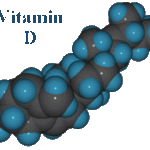Vitamin D levels and adiposity
 Researchers at the University of Michigan, in Ann Arbor, investigated the association between vitamin D and BMI (body mass index).
Researchers at the University of Michigan, in Ann Arbor, investigated the association between vitamin D and BMI (body mass index).
First, the details.
- In a randomly selected group of 479 schoolchildren, vitamin D blood levels (25-hydroxyvitamin D [25(OH)D) were measured.
- Deficient [25(OH)D concentrations: less than 50 nmol/L]
- Insufficient [50 to less than 75 nmol/L]
- Sufficient [at least 75 nmol/L]
- Anthropometric (human body measurement) variables were recorded annually for about 30 months.
- The average change in each anthropometric indicator according to baseline vitamin D status was calculated.
And, the results.
- Vitamin D-deficient children had a significantly greater change in BMI (body mas index) than vitamin D-sufficient children.
- Similarly, vitamin D-deficient children had a significant increase in anthropometric measurements, including a greater change in waist circumference vs vitamin D-sufficient children.
- Vitamin D deficiency was related to significantly slower linear growth in girls but not in boys.
The bottom line?
The authors concluded, “Vitamin D serostatus [blood level] was inversely associated with the development of adiposity in school-age children.
It’s another reason to update the supplement recommendations for vitamin D.
12/9/10 20:20 JR